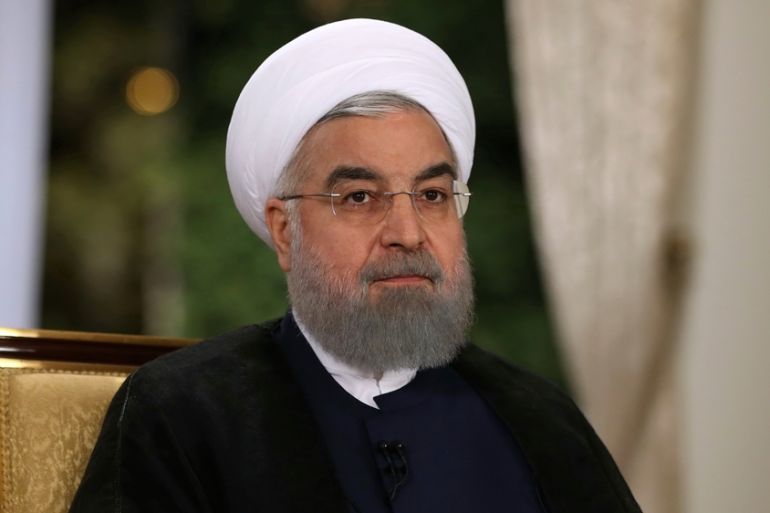Rouhani: Saudis ‘should stop backing terrorists’
Kingdom’s policies in Yemen and Syria described as main hurdles to improving ties between Iran and Saudi Arabia.

Iranian President Hassan Rouhani has accused the country’s rival Saudi Arabia of backing terrorists in the Yemeni civil war, according to state TV.
Saudi Arabia and Iran compete for influence in the Middle East, where they support rival groups in Yemen, Syria, Iraq and Lebanon.
Keep reading
list of 4 itemsWho will be Iran’s next president? | Start Here
Oil slumps two percent on possible return of Iranian supply
Border security a common concern for Pakistan and Iran: Rouhani
“Saudi Arabia’s intervention in Yemen and their support of terrorists in Yemen and Syria are main hurdles to improve ties between Tehran and Riyadh. Saudi Arabia should stop backing terrorists,” Rouhani told state TV on Tuesday.
READ MORE: Key facts about the war in Yemen
In September 2014, Iran-allied Houthi fighters took control of Yemen’s capital, Sanaa, and proceeded to push southwards towards the country’s second-biggest city, Aden.
In response to the Houthis’ advances, a Saudi-led coalition of Arab states launched a military campaign in 2015 to defeat the Shia fighters and restore Yemen’s government.
Nuclear deal question
In his address, Rouhani also discussed the 2015 nuclear deal and said that Iran would honour it.
However, he dismissed the idea of inspections at its military sites, reportedly floated by the United States, saying they were not required under the deal with world powers.
“Our commitments to the world are clear … our relations with the IAEA (International Atomic Energy Association) are defined by rules, not by the US,” Rouhani said in the televised address.
“I see it as unlikely that the IAEA will accept the request for inspections, but even if they do, we will not.”
READ MORE: Iran and world powers clinch historic nuclear deal
He was responding to news media reports that Nikki Haley, US ambassador to the UN, last week met IAEA chief Yukiya Amano and discussed accessing Iranian military sites in order to ensure Iran’s compliance with the deal.
The accord saw international sanctions eased in exchange for stringent controls on Iran’s nuclear programme and closer IAEA inspections.
The inspections are designed to prevent nuclear material being moved from nuclear centres to other areas, including military bases.
The IAEA has repeatedly reported that Iran is in compliance with the deal.
‘Difficult situation’
Rouhani said Iran had the support of Europe and other signatories, and added that US President Donald Trump would struggle to muster support for tearing it up.
“The US is in the most difficult situation in its history for creating unity against us and I think it’s not possible for it to do so now,” Rouhani said.
Despite the pushback, the deal remains under threat.
|
|
The US has strongly criticised recent Iranian missile tests and imposed new, non-nuclear sanctions – prompting Rouhani to hint in mid-August that Iran could easily walk away from the deal “within hours” if forced to do so.
Haley responded that new US sanctions against Iran relate to Iran’s support for “worldwide terrorism” and other destabilising actions in the region.
She said Iran could not “use the nuclear deal to hold the world hostage”.
Trump is due to notify Congress in October about whether Iran is adhering to the deal.